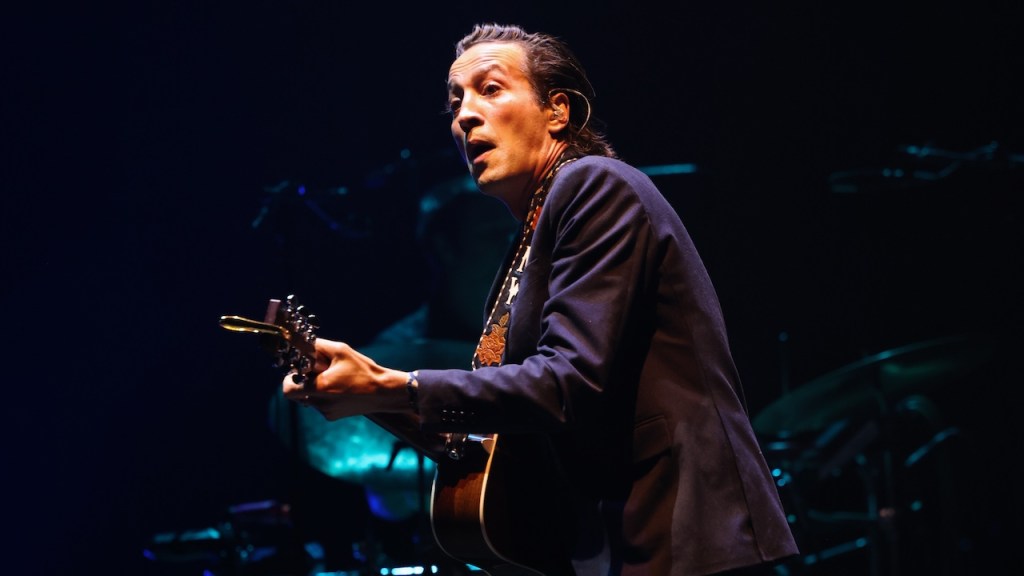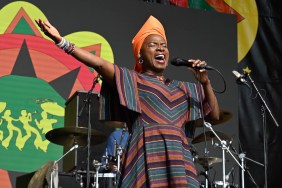Marlon Williams performed at Melbourne’s Palais Theatre on Saturday, 18th February. Dylan Hyde reviews.
Marlon Williams began his set at the Palais Theatre in Melbourne by prancing back and forth in the darkness singing ‘E Mawehe Ana Au’ unaccompanied. It was the first of three waiata (songs in Māori language) and a stunning opening. Somewhere between a haka and a hymn, Williams’ mellifluous tenor perforated the hush of the expectant audience.
From a cappella, the lights came up to Williams on acoustic guitar performing ‘Devil’s Daughter’, a song from his 2020 collaborative album with the Canadian folk duo Kacy & Clayton, Plastic Bouquet, followed by a gorgeous rendition of ‘My Boy’.
It was a homecoming of sorts. The conclusion to an extensive international tour in support of his latest album, My Boy, which launched with an intimate gig at Howler in Melbourne’s inner north a little over five months ago. Williams was a Melbourne resident from 2013 until his return to New Zealand at the start of the pandemic.
The new album is something of a love letter to Aotearoa (New Zealand) following Williams’ 2018 break-up album, Make Way for Love, and the setlist included all bar one track from the album.
Marlon Williams – ‘My Boy’
All the world’s a stage for Marlon Williams, who’s also an accomplished television and screen actor. Despite his triumphs, Williams showed genuine warmth for his audience bordering on sycophancy. There was perhaps a little too much banter and detail about songs before they played out, but this seems to be Marlon’s stock in trade and the audience lapped it.
For instance, we learned that ‘Don’t Go Back’ from My Boy is not about leaving behind a political cause nor some existential allegory, but simply about not going back to a party. The character in ‘Party Boy’ (a hit from Make Way For Love) is anybody but Williams. “Party boy, I don’t like you” he crooned. But when the opening bars of the song were heard, the audience rose from their seats and Williams obliged them by wandering through the aisles.
There is not a skerrick of rock star vanity about Williams and perhaps there ought to be for his sake, but it seems he doesn’t care for such things. His next album is reportedly to be entirely waiata, which probably confirms this. The stage design was equally unpretentious, featuring a simple drape backdrop.
There is a mellowness to Williams’ floating voice that would’ve been better served by a richer musical backing. The pedal steel that so complements his voice on record was missing and his band, the Yarra Benders, sounded a little flat and shallow in support on some of his songs. The bountiful, layered sound of My Boy – recorded without them – was not quite there at the Palais.
There was a dip in the energy of the performance through the middle, but it was a privilege to watch an artist as unique as Williams take flight. His voice soared on a cover of Barry Gibb’s torch song, ‘Promises’, as well as Björk’s ‘Come to Me,’ which followed a rendition of his enchanting single of the same name, sounding a little diminished without its string accompaniment.
Marlon Williams – ‘Party Boy’
‘Easy Does It’, with its lush arrangement, including violin replacing the lap steel of the recording, soon moved into one of the evening’s lovely surprises, ‘Thinking of Nina’, a song written through the Covid lockdown about the central character in the spy drama, The Americans, that sounded far better live than on record.
Electric guitar replaced acoustic for the waiata ‘Aua atu rā’, an evocative islander song Williams translated in its entirety before he performed it. It tells the tale of a sailor on a boat filling with water when the weather has turned and the wind has died; “Fuck it” is its refrain in te reo Māori. Then to the keyboards for the swirling vocals on ‘Princes Walk’. “I don’t know anything about this song”, Williams confessed, “I just wrote it.”
The infectious tempo of ‘Vampire Again’ with shadow puppetry on the backdrop was followed by ‘Nobody Gets What They Want Anymore’, as fabulous as one would expect of that song.
Williams returned to a rousing reception for three encores starting with Jim Reeves’ ‘He’ll Have to Go’ on solo acoustic guitar before finishing with ‘Dark Child’ from his 2015 self-titled debut release and the lush ‘Te Hokinga Mai’, a Māori folk song about “the return of international respect for Māori art and culture”.
Marlon Williams is, no doubt, helping to expand this respect.
Further Reading
Riverboats Music Festival 2023 Lineup: Marlon Williams, C.W. Stoneking, The Whitlams and More
Marlon Williams Announces Melbourne Album Launch Show
Laura Jean Releases Collab With Aldous Harding And Marlon Williams












